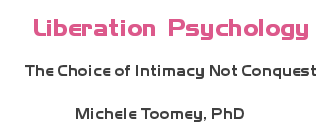Introduction to Women's Mythical Liberation Tales
© 1993 Michele Toomey, PhD
Before you listen to or read these tales, I thought it might be helpful to give you a brief synopsis of the psychological approach that informs them.
They are an outgrowth of my 20 years of work as a feminist therapist, theorist, and psychological educator. I have developed an approach to the nature of the self's inner world that I call liberation psychology. It is a non-violent, non-hierarchical and non-sexist approach to power that assumes that the self is by nature a paradoxical being with a natural integrity. Further, it assumes that these paradoxical forces are governed by integrity and are all equally legitimate and desired. The relationship between these forces is viewed as one based on an equal and fair exchange designed to allow contradictory needs and desires to be reconciled with, not at war with each other. Opposite is not defined as antagonistic.
There is no inequality or desire for dominance in this approach, therefore, those forces traditionally labeled female are no less desired or needed than those traditionally labeled male. Yielding to vulnerability and being emotionally involved is not inferior to aggressive acts and detached thoughts. Independence is not superior to dependence. Each is a desired capacity that allows the self to handle the complexity of reconciling paradox and being intimate and at one with itself. No force is seen as innately evil, so none need be feared in and of itself. However, any force has the potential to be used for an evil purpose. A person, therefore, rather than a force, would be needed to be feared if a force is used to violate.
Liberation psychology assumes that the self is governed by a natural integrity and that to preserve that integrity it must learn how to live by the natural laws governing its paradoxical nature. Learning to live by the integrity of these natural laws is a complex process that the self must be taught. It must be taught how to live reconciled with, not in control of, its paradoxical forces. Reconciling paradox leads to intimacy and oneness, not dominance and conquest. Consequently, intimacy is the desired goal of liberation and domination is seen as a violation of the self and of its natural integrity.
The liberation approach assumes that the self's natural integrity allows it to be whole and at one, provided the self learns the complex process of reconciling its paradoxical forces and does not violate itself by allowing one force to dominate another and then attribute superiority to the dominant force. To reconcile our paradoxical nature, each force must have its expression and its boundary. Over-indulgence of any one force is as violating to a self's integrity as is excessive abstinence. Self-discipline is necessary for liberation, but too much discipline and rigidity are as violating as too little. Always, movement back and forth between the self's paradoxical forces keeps the self's system fluid and its integrity intact.
Liberation, in this system, is the freedom to be intimate with, not in control of, ourselves. Power is defined as energy, not control, and the ability to move, not the ability to control, is seen as the exercising of power. Desire is viewed as the source of the self's energy, its power that provides it with its driving force and prompts both internal and external movement. Desire, therefore, is valued, not feared, and intensity of desire is seen as the measure of the self's strength. Movement is central to and essential for liberation, and that makes desire essential to liberation as well. I would ask you to note the role of desire in the tales.
Liberation psychology frees power from being genderized into male superiority and female inferiority, and battles that are won and lost are no longer the primary exchange of power. Contrary to traditional myths that are expressions of the traditional approach to power as dominance, where good and evil forces personified in female and male figures are at war with themselves or each other, liberation myths explore the inner struggle of women caught in this destructive approach. Their liberation is dependent on their responding with integrity to themselves and their paradoxical desires.
I chose to turn to writing mythical tales because I wanted the power of myth for my work. Traditional myths that perpetuate battle imagery and power as conquest have a fierce hold on us. Our definition of reality and our relationship to hope are both rooted in these battles between good and evil and in wars won and lost. To free ourselves from our own oppression we must let go of this approach and embrace an alternative one. I hope the power of the metaphor of myth will help you to make this move. In liberation psychology I offer you new myths and a new approach. |



